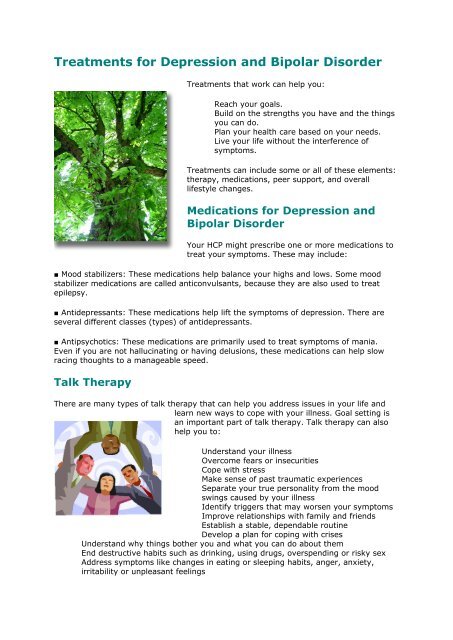CODEPENDENCE - DEAN AMORY
PERSONALITY DISORDER, CODEPENDENCE, RELATIONSHIPS, PSYCHOLOGY, LOVE, MATRIMONY, LIFE, LIVE,
PERSONALITY DISORDER, CODEPENDENCE, RELATIONSHIPS, PSYCHOLOGY, LOVE, MATRIMONY, LIFE, LIVE,
You also want an ePaper? Increase the reach of your titles
YUMPU automatically turns print PDFs into web optimized ePapers that Google loves.
Treatments for Depression and Bipolar Disorder<br />
Treatments that work can help you:<br />
Reach your goals.<br />
Build on the strengths you have and the things<br />
you can do.<br />
Plan your health care based on your needs.<br />
Live your life without the interference of<br />
symptoms.<br />
Treatments can include some or all of these elements:<br />
therapy, medications, peer support, and overall<br />
lifestyle changes.<br />
Medications for Depression and<br />
Bipolar Disorder<br />
Your HCP might prescribe one or more medications to<br />
treat your symptoms. These may include:<br />
■ Mood stabilizers: These medications help balance your highs and lows. Some mood<br />
stabilizer medications are called anticonvulsants, because they are also used to treat<br />
epilepsy.<br />
■ Antidepressants: These medications help lift the symptoms of depression. There are<br />
several different classes (types) of antidepressants.<br />
■ Antipsychotics: These medications are primarily used to treat symptoms of mania.<br />
Even if you are not hallucinating or having delusions, these medications can help slow<br />
racing thoughts to a manageable speed.<br />
Talk Therapy<br />
There are many types of talk therapy that can help you address issues in your life and<br />
learn new ways to cope with your illness. Goal setting is<br />
an important part of talk therapy. Talk therapy can also<br />
help you to:<br />
Understand your illness<br />
Overcome fears or insecurities<br />
Cope with stress<br />
Make sense of past traumatic experiences<br />
Separate your true personality from the mood<br />
swings caused by your illness<br />
Identify triggers that may worsen your symptoms<br />
Improve relationships with family and friends<br />
Establish a stable, dependable routine<br />
Develop a plan for coping with crises<br />
Understand why things bother you and what you can do about them<br />
End destructive habits such as drinking, using drugs, overspending or risky sex<br />
Address symptoms like changes in eating or sleeping habits, anger, anxiety,<br />
irritability or unpleasant feelings


















